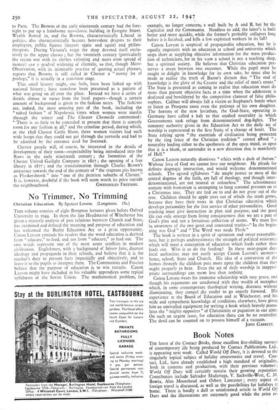No Trimmer, No Trimming
Christian Education. By Spencer Leeson. (Longmans. 15s.)
THIS volume consists of eight Bampton lectures given before Oxford University in 1944. In them the late Headmaster of Winchester has given a masterly analysis of past relations between Church and State, has examined and defined the meaning and purpose of education and has welcomed the Butler Education Act as a great opportunity. Canon Leeson reminds his readers that the word education is derived from " educare," to feed, and not from " educere," to lead out. The two words represent one of the most acute conflicts in modern civilisation. Englishmen, with a background of laisser faire, distrust ideology and propaganda in their schools; and believe that it is the teacher's duty to present facts impartially and objectively, and to leave it to the pupils to interpret them. The Communists and Fascists believe that the purpose of education is to win recruits. Canon Leeson might have included in his valuable appendices some typical syllabuses of the Soviet Union. The mathematical problem, for
example, no longer concerns a wall built by A and B, but by the Capitalist and the Communist. Needless to add; the latter's is built better and more quickly, while the former's probably collapses long before it is finished, and kills a few exploited workers in its fall!
Canon Leeson is sceptical of propagandist education, but he is equally, impatient with an education at school and university which stops short at supplying objective- information for the mass produc- tion of technicians, for in his view a school. is not a teaching shop, but a spiritual society. He believes that Christian education pre- serves a mean between two extremes. While the pupil must be taught to delight in knowledge for its own sake, he must also be made to realise the truth of Bacon's dictum that " The end of knowledge is the glory of the Creator and the relief of man's estate." The State is presented as coming to realise that education must do more than present objective facts at a time when the adolescent is deafened and bewildered by the competitive clamour of false philo- sophies. Caliban will always fall a victim to Stephano's bottle when to listen to Prospero taxes even the patience of his own daughter. The horrors of the new leviathan, the God-State, operating in Germany have called a halt to that studied neutrality in which Governments took refuge from denominational dog-fights. The statutory authority given in the Education Act to the daily act of worship is represented as the first fruits of a change of heart. The State relying upon " the essentials of civilisation being protected by the ring fence of the Christian tradition" cannot afford " a neutrality leading either to the apotheosis of the open mind, so open that it is a blank, or surrender to a new direction that is manifestly of Hell."
Canon Leeson naturally dismisses " ethics with a dash of theism." Without love of God we cannot love our neighbour. He pleads for definite dogmatic instruction, and would welcome denominational schools. The agreed syllabuses " do ample justice to most of the central dogmas of the faith, are full of theology, and though inter- denominational, are not neutral or colourless." The schoolmaster content with humanism is attempting to hang seasonal presents on to a Christmas tree. They are tied on to and do not grow out of the tree. Children should be apple trees out of which the truth grows, because they have their roots in that Christian education which develops personality for the free service of other personalities. Good teaching must give instruction in plan. and purpose, and the good life can only emerge from living consciousness that we are a part of God's plan and not a fortuitous collection of atoms. We must live in awareness of the two great and connected truths—" In the begin- ning was God " and " The Word was made Flesh."
The book is written in a spirit of optimism and sweet reasonable- ness, but it perhaps underestimates the strength of political resistance which will meet a conception of education which feeds rather than leads out. Who is to do the feeding? In these near-pagan days local authorities may not easily accept Canon Leeson's answer— home, school, State and Church. His idea of a conversion of the homes through the children puts more upon the children than they ought properly to bear. Even the act of daily worship in inappro- priate surroundings can mean less than nothing.
Canon Leeson wears his immense scholarship with easy grace, and though his arguments are unadorned with that wealth of metaphor which, in some contemporary theological writing, distracts without illuminating, they compel the reader to go eagerly forward. His experience at the Board of Education and at Winchester, and his wide and sympathetic knowledge of conditions elsewhere, have given him an unrivalled equipment for writing a book which bravely postu- lates the " mighty opposites " of Christianity or paganism in our time. On such an urgent issue, for education there can be no neutrality. The devil can be counted on to possess himself of a vacuum.
JOHN GA1RRETT.


































 Previous page
Previous page